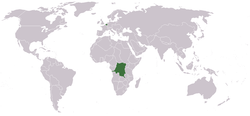- International Association of the Congo
-
International Congo Society
Association internationale du CongoProvisional government ← 
1879–1885  →
→Capital Boma Political structure Provisional government Owner Leopold II of Belgium Chairman Maximilien Strauch Plenipotentiary Henry Morton Stanley Historical era New Imperialism - Established November 17, 1879 - Flag recognized April 10, 1884 - Sovereignty recognized November 8, 1884 - Free state established 1885 The International Association of the Congo, also known as the International Congo Society (French: Association internationale du Congo), was an association founded on November 17, 1879 by Leopold II of Belgium to further his interests in the Congo. It replaced the Belgian Committee for studies of High-Congo (French: Comité d'études du Haut-Congo), which was part of the Association internationale africaine created for exploration of the Congo. The goals of the International Congo Society was to establish control of the Congo basin and to exploit its economic resources. The Berlin Conference recognized the society as sovereign over the territories it controlled and in 1885 its structures were acquired by the Congo Free State.
Berlin Conference
Main article: Berlin ConferenceThe Berlin Conference or Congo Conference of 1884–85 regulated European colonization and trade in Africa. King Leopold II was able to convince the powers at the conference that common trade in Africa was in the best interests of all countries. The General Act of the conference divided Africa between the main powers of Europe and confirmed the territory controlled by the Congo Society as its private property, which essentially made it the property of Leopold II.
On April 10, 1884, United States Senate authorized President Chester A. Arthur "to recognize the flag of the AIC as the equal of that of an allied government". On November 8, 1884, Germany recognized the sovereignty of the society over Congo.
External links
- Timeline for Congo — History Commons
This African history–related article is a stub. You can help Wikipedia by expanding it.


